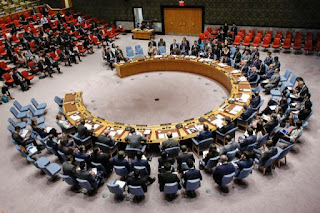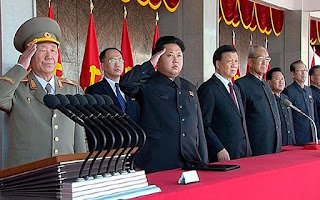Strategic Deterrence and Containment of the North Korea Regime
Strategic
Deterrence and Containment of the North Korea Regime
E. Stanley Ukeni
So we are in a new
year—supposedly a time of new beginnings and unknown expectations. Predictably,
pundits have since the New Year been pontificating on possible surprises that
2018 holds. Of course, one of the most analyzed topics is how the crisis in the
Koran peninsular would evolve.
Well, unlike the majority of
experts, I opt to sue for peace. I’m sure some are wondering why I’m so bullish
on a peace prospect. I will tell you, but before elaborate I think it’s
important we reflect on the more recent past developments pertaining to the
North Korean issue.
In a diplomatic move to ratchet
up pressure on the North Korean regime in other to force it to abandon its
nuclear ambitions, the United Nations’ Security Council, on Friday, December 22nd
2017, unanimously agreed on the imposition of new sanctions on North Korean. To
be honest, I was quite surprised that even China and Russia—the traditional
ally of the North Korean government, voted for the imposition of sanctions. I
wondered why they would do so. What was in it for them?
But then it makes sense that
the two, veto wielding, permanent members of the UN Security Council would
endorse sanctions. This is because the argument for sanction was given more
weigh by the stubborn refusal of the leaders of North Korea has to return to
the negotiation table—citing their desire to significantly bolster their
nuclear and missile deterrence capability before considering returning to the
negotiation table.
In a statement following the unanimous
decision by the U.N. Security Council, the United States’ ambassador to the UN,
Nikki Haley, said, “It (the UN adopted resolution) sends the unambiguous
message to Pyongyang that further defiance with invite further punishment and
isolation”.
This current round of sanctions
was imposed in response to North Korea’s latest intercontinental ballistic
missile test on the 29th of November 2017—a flagrant violation of
previous U.N. resolutions against the country’s testing or fielding any
offensive ballistic missile technology.
The United States-drafted
resolution seeks to ban as much as 90 percent of refined petroleum product that
the North Korean government can import by capping crude oil purchase at 500,000
barrels a year, and the expulsion of North Korean citizens working overseas
within 24 months. The U.N. resolution aims to cap crude oil supplies to North
Korea at 4 million barrels a year.
This most recent round of sanctions
regime against the hermit kingdom is designed to bring the country’s struggling
economy—which has been battered by previous U.N. sanctions against the country,
to its knee, and compel the North Korean leadership to return to peace
negotiation.
However, I don’t expect it to
accomplish its stated objective. Here is why. The two key strategic allies of
North Korea, China and Russia, both have way too much at stake—particularly in
the area of medium to long term strategic defense interests, to be swayed by
the argument about the advancement of global peace and security. I think that
by voting for the imposition of sanctions, both countries are playing for time.
The North Koreans on the other
hand are playing an entirely different game. The entire country is in war
footing. I believe that the leadership in Pyongyang is operating under a siege
mentality.
I suspect that the North Korean
regime have had time to devise a vast and sophisticated system of sanctions
evasion. They probably have trained operatives and agents with unique abilities
to move money and goods across borders, in anticipation of this eventuality—including
the procurement of weapons related materials, technologies and other prohibited
items. Even now, countries with hidden agendas and unscrupulous corporate
entities are already violating the sanctions regime.
I am of the opinion that prospect
of monetizing the increased risk associated with the violation of the sanctions
regime will invariably incentivize adventurous profiteers. My sense is that the
risk reward ratio suggests that sanctions will prove ineffective in crippling
the North Korean economy.
If sanctions would have any
chance of compelling the North Koreans back to the negotiation table, there
must be concerted effort at enhanced surveillance of monitoring by the
international community. It seems this is already the case. The sanctions
pressure so far appears to be a winning strategy.
On Tuesday, the 9th
of January 2018—perhaps yielding to international pressure, senior North Korean
officials agreed to meet their Southern counterparts at the border village of
Panmunjom to initiate formal talks at reducing military tension in the Korean
peninsula and other issues. This would be their first formal face to face
dialog in two years—a remarkable step towards the advancement of peace and security
in the Korean peninsula.
In yet another sign that
Pyongyang has begun paying heed to the demands of the international community,
South Korean Yonhap news agency has reported that a member of the North Korea
delegation to the talk in Panmunjom told South Korean negotiators that
Pyongyang has once again restored a military hotline with the South.
This would
be the second time in about a week that the North has reestablished the
previously suspended inter-Korean communication channel.
It should be recalled that all
major inter-Korean communication channels had been shut down as a result of
hostilities over North Korea’s aggressive pursuit of an offensive nuclear and
ballistic missile program, in recent years.
According to Reuters news
agency, the spokesman for the U.N. Secretary General Antonio Guterres, on
Tuesday issued a statement stating that Guterres welcomed “the agreement to
work to ease military tensions, hold military-to-military talks, and reopen the
inter-Korean military hotline”.
The statement by the Secretary
General’s spokesman, Stéphane Dujarric, further added
that, “The re-establishment and strengthening of such channels is critical to
lowering the risk of miscalculation or misunderstanding and to reduce tension
in the region”.
Well, we are not even up to two
weeks into the New Year, and it already looks like the year is off to a good
start. However, it’s way too early to start celebrating. I foresee ominous dark
clouds still hovering over our world—there may yet be an unforeseen disastrous
geopolitical event in 2018 that would plunge our world into an era of
intractable global insecurity. There is a need to maintain sustained vigilance
if this trend towards peace and security in the Korean peninsula will be
sustained.
And for those who still harbor
the flawed notion that war is the most viable means of eliminating the threat
that a nuclear armed North Korea possess to the United States, Japan and South
Korea, consider the real prospect that a war in the Korean would unravel the global
order, and perhaps unleash a global catastrophe the likes of which the world
had not seen since the Second World War.
Authored by E. Stanley Ukeni, ©
2018. All Rights Reserved. This material and other articles or stories posted
on this blog site may not be reproduced, published, broadcast, rewritten or
redistributed, in whole or in part, without prior expressed written permission
from the author, E. Stanley Ukeni.
You are invited to follow E.
Stanley Ukeni on twitter at; @EzStan . You’re equally invited to follow him on
google+. Oh yeah, don’t forget to subscribe to this blog Site. Thanks.
Photo
Credits:




Comments
Post a Comment